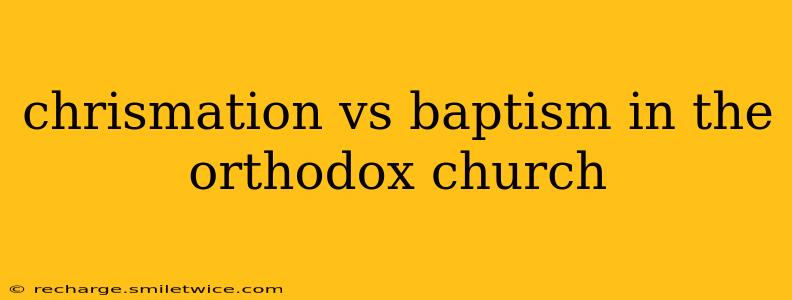The Orthodox Church views Baptism and Chrismation (also known as Confirmation in other Christian traditions) as distinct yet inseparable sacraments, administered consecutively in a single ceremony. While often treated as one event in Western Christianity, the Orthodox Church emphasizes their unique roles in a believer's spiritual life. This distinction highlights the richness and depth of Orthodox theology. Understanding the difference between Chrismation and Baptism is crucial to understanding the Orthodox faith.
What is Baptism in the Orthodox Church?
Baptism is the first and most foundational sacrament in the Orthodox Church. It signifies the death and resurrection of the old self and the birth into new life in Christ. Through baptism, an individual is cleansed from original sin and all personal sins committed before the sacrament. The ritual involves full immersion in water, symbolizing the washing away of impurities and a complete surrender to God's grace. The act itself isn't just symbolic; it’s believed to be the actual cleansing and renewal of the soul.
Symbolic Meaning of Orthodox Baptism:
The act of submersion in water symbolizes the burial of the old self, mirroring Christ's own burial. Emerging from the water represents the resurrection to new life in Christ, a new beginning free from the weight of sin. The threefold immersion—performed three times in the name of the Father, the Son, and the Holy Spirit—emphasizes the completeness of this transformation.
What is Chrismation in the Orthodox Church?
Immediately following Baptism, the newly baptized individual receives Chrismation. This sacrament is the sealing of the Holy Spirit upon the newly baptized, granting them the gifts of the Spirit and fully incorporating them into the life of the Church. The priest anoints the believer with sacred Chrism (myron), a fragrant oil blessed by the Church, on various parts of the body. This anointing isn't merely symbolic; it's believed to impart the grace of the Holy Spirit, making the individual a true temple of God.
Symbolic Meaning of Orthodox Chrismation:
The anointing with Chrism signifies the bestowal of the Holy Spirit, empowering the newly baptized to live a life guided by divine grace. The fragrance of the Chrism symbolizes the sweet aroma of Christ and the spiritual beauty conferred upon the individual. The various parts of the body anointed represent the complete transformation and sanctification of the whole person.
Are Baptism and Chrismation Separate Sacraments?
Yes, while administered consecutively, Baptism and Chrismation are distinct sacraments. Baptism washes away sin and initiates into the Christian life, while Chrismation bestows the gifts of the Holy Spirit and fully unites the believer with the Church. One cannot truly be considered a member of the Orthodox Church without receiving both sacraments.
What Happens After Baptism and Chrismation?
Following the sacraments, the newly baptized and chrismated individual is welcomed into the full communion of the Church. They are now able to participate fully in the Eucharist (Holy Communion), receive other sacraments, and live a life guided by the grace of the Holy Spirit. This is a time of spiritual growth and deepening faith, supported by the community of the Church.
What is the difference between Chrismation and Confirmation?
While Chrismation in the Orthodox Church is often compared to Confirmation in Western Christianity, there's a key difference. In many Western traditions, Confirmation is a separate rite, often administered years after Baptism. In the Orthodox Church, the two sacraments are inseparable, administered immediately after Baptism as one continuous spiritual experience. This highlights the Orthodox emphasis on the seamless and immediate work of the Holy Spirit in bringing individuals into the life of the Church.
Can someone be baptized without being chrismated?
No, in the Orthodox Church, Chrismation is inseparably linked to Baptism. They are administered together as one continuous rite. The act of baptism alone doesn't fully initiate a person into the body of Christ; the Holy Spirit's anointing through Chrismation is essential to complete the sacramental experience and the full incorporation into the Church.
Is Chrismation necessary for Salvation?
While salvation is ultimately a gift of God's grace, the Orthodox Church teaches that receiving the sacraments, including Baptism and Chrismation, is essential for full participation in the life of the Church and the fullness of God's grace in a person's life. The sacraments are not merely symbolic acts but channels through which God's grace is imparted.
This article provides a basic overview; further study of Orthodox theology is recommended for a more complete understanding. Remember to consult with an Orthodox priest or theologian for any further questions.
